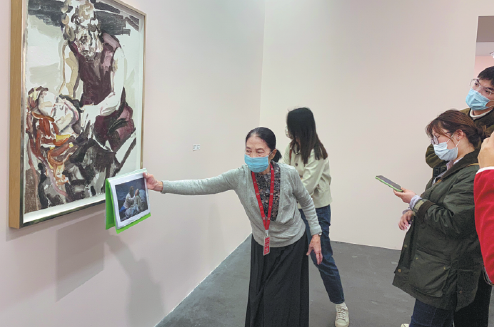Guide of an enlightened age


UCCA celebrates septuagenarian docent, proving it's never too late to learn something new, Wang Qian reports.
Chen Shaoqin, 70, is a bit of a celebrity at the UCCA Center for Contemporary Art in 798 Art District in Beijing.
While some seniors at her age have been left behind by new technologies, Chen has beaten the odds to enter the world of contemporary art and become a docent at UCCA that visitors often request by name.
"Nothing is impossible as long as you stay curious," Chen says.
The eldest docent at UCCA, she has logged more than 2,500 hours as a volunteer guide over the last four years and her explanations of art have impressed many celebrated figures in the country's contemporary art scene, including Zeng Fanzhi and Qiu Zhijie.
"I hope my story will encourage more senior citizens to enter galleries and museums as well as attract more children to art," Chen says, smiling.
She has gone viral on micro-blogging platform Sina Weibo after her passion for art made national headlines. The story was viewed more than 58 million times. People online have nicknamed her Grandma Chen, commenting that her story proves the idiom that one is "never too old to learn".
In the eyes of Zhang Luowei, who has worked with her, Chen approaches her job with passion and puts great effort into preparing her "very effective" talks.
"Her pure love for art has, I believe, created an important foundation for me to continue my progress in the art world," says Zhang, a student from New York University, who recounts the story of his volunteer days with Chen on his blog.
Philip Tinari, the director and CEO of UCCA, writes about Chen on the title page of Art and China After 1989: Theater of the World, "many many thanks for all you have contributed to UCCA and to art in China over these many years." Chen received a copy of the book as a special gift from the center for her 70th birthday.
Factory worker
When she left her hometown of Xiamen in Fujian province for Beijing in late 2008 to help care for her granddaughter, as many Chinese grandparents do, Chen didn't expect that her life would be so colorful.
"Unfamiliar with the capital, I found 798 close to our home, which seemed like a good place for a walk with my granddaughter," Chen remembers.
With no background in art, Chen was still amazed by the galleries in the art district. What impressed her most was a huge Buddha sculpture made of incense ash by artist Zhang Huan at the entrance of UCCA.
"I still remembered the shocking feeling of seeing the sculpture. The artist recycled incense ash, which represents people's wishes, into an artwork," Chen says, adding that it was the moment that she decided to investigate the world of contemporary art. She paid 200 yuan ($30) for a one-year membership at UCCA.Now it is 500 yuan a year.
"I come here more than 40 times a year. As long as I am in Beijing, every weekend I will be here with my granddaughter," Chen says.
Chen describes herself as being "artistically illiterate" before coming to Beijing.
Born into an ordinary family in Xiamen, Chen became a factory worker in Jiangxi province after graduating from junior high school in 1966 when the "cultural revolution" (1966-76) began.
Upon seeing a recruitment advertisement for a foreign trade company in a newspaper, she decided to apply for the job and started to learn English. After following an English distance course for more than a year, Chen mastered basic skills in the language and graduated from Jiangxi Open University in 1980.
As she had hoped, she got a job at a white-collar company.
However, she didn't stop learning and finished her English course at Jiangxi Normal University in 1987.
Having witnessed the country's ups and downs over the past decades, Chen has never given up and made every effort to improve her quality of life.
"In the past, art was inaccessible, but now it is not. What we need to do is to go, look and see," Chen says.
Interpreting art
After being a member of UCCA for eight years, in 2016, Chen was invited to be a volunteer guide for Zeng Fanzhi: Parcours.
"At first, I hesitated, because of my Fujian accent and my limited knowledge about the exhibition," Chen says.
The director of the docent program, Wang Zhi, assuaged her fears and told her that Zeng would offer training to the docents before the exhibition.
"I said 'yes' immediately, because it was the chance of a lifetime to interact with the artist in person," Chen remembers with excitement.
Making contemporary art accessible to all, the UCCA docent program aims to train volunteer guides who provide context and understanding for visitors to exhibitions by leading in-depth tours, answering questions, and fostering conversations about the work on display. These docents broaden the experience of the more than 1 million visitors, ranging from preschoolers to seniors, who visit the art center each year.
Working among other docents who are in their 20s and 30s, Chen says her age comes with an advantage: No matter how famous an artist is, he or she cannot refuse her questions. As a result, many artists have imparted anecdotes about the creation of their exhibited pieces.
As a result, alongside the required information about the artist and the artworks on show, Chen has many stories and asides to share with visitors.
Zeng told her that he didn't correct a little flaw on his oil painting Lucian Freud, because he was so sad to hear that the British painter passed away before the painting was finished in 2011.
"The flaw is like leaving a regret on the canvas forever," Chen quotes Zeng.
To prepare for Hao Liang: Eight Views of Xiaoxiang, which was held at UCCA from November 2016 to January 2017, Chen wrote 22 pages of notes.
In 2018, during the major exhibition Xu Bing: Thought and Method, she volunteered for 300 hours, eight times the normal workload.
She has been a docent to many exhibitions, including Qiu Zhijie: Mappa Mundi, Picasso-Birth of a Genius, Matthew Barney: Redoubt and the ongoing Elizabeth Peyton: Practice.
She has even been an English docent for foreign visitors to the center.
"My English is not good, but I dare to speak it and keep studying," Chen says.
Leading a 60-minute tour means that you must have the physical ability to do it, regardless of age.
"I don't feel tired. Every exhibition is a journey of art appreciation, which is fresh and touching to me," she adds.



































